North Korea agrees to investigate Japanese kidnappings
Loading...
| Tokyo
North Korea has agreed to reopen an investigation into the fate of Japanese citizens it kidnapped decades ago, Japanese Prime Minister Shinzo Abe said on Thursday, a potential breakthrough in a bitter dispute between Tokyo and Pyongyang.
Japan has agreed to ease some sanctions against North Korea once the probe had been reopened and will consider providing humanitarian aid depending on how the investigation progresses, Chief Cabinet Secretary Yoshihide Suga said separately.
"Our job will not end until every parent can embrace their children with their own arms," Abe told reporters. "This is a first step toward an overall resolution."
North Korea promised in 2008 to re-open the probe – but it never followed through. It also reneged on promises made in multilateral talks aimed at ending its nuclear weapons program and declared the negotiations over.
The agreement on the abductees probe comes at a time of regional concerns that Pyongyang may be preparing for a fourth nuclear test in contravention of U.N. sanctions.
Asked whether Japan's actions meant Tokyo was out of step with Washington and Seoul, Suga told a news conference: "It's impossible. This agreement covers sanctions that Japan imposed on its own. It is not related to U.N. sanctions."
Suga added that Japan would keep pressing for a "comprehensive resolution" to the issues of the abductees and the threats from North Korea's nuclear and missile development programs before it would normalize ties.
Japanese and North Korean officials met in Stockholm this week to discuss the abductees dispute as well as North Korea's nuclear and missile programs, but officials had previously said only that the two sides agreed only to keep talking.
EASING SANCTIONS
North Korea has been under U.N. sanctions since its first nuclear test in 2006, banning it from conducting atomic and missile tests, barring U.N. member states from weapons trade with Pyongyang and from financial transactions that facilitate them.
North Korea admitted in 2002 to kidnapping Japanese citizens in the 1970s and 1980s to help train spies. Five abductees and their families returned to Japan.
North Korea has said the remaining eight were dead and that the issue was closed, but Japan has pressed for more information about their fate and others that Tokyo believes were also kidnapped.
"The DPRK (North Korea) side ... expressed the willingness to conduct a comprehensive and full-scale survey for the final settlement of all issues related to Japan," North Korea's official KCNA news agency said in a near-simultaneous announcement.
"When survivors are found, while handling the remains of Japanese, the DPRK side agreed to discuss the issue of course of action and take the necessary measures in the direction of sending them back to Japan," the statement said.
Suga said that, once Pyongyang began the new investigation, Tokyo would lift restrictions on travel, fund remittances to North Korea and an embargo on the entry to Japanese ports of North Korea-flagged ships with humanitarian missions.
Japan also agreed to examine humanitarian aid to Pyongyang at an "appropriate time", Suga added.
Abe, who took office for a rare second term in December 2012, has long made efforts to resolve the abductees issue a key part of his political agenda.
Relatives of the kidnapped Japanese welcomed the news, although some said Japan should wait to see results before easing its sanctions.
Japan was a driving force behind a U.N. report, released earlier this year, calling on North Korean leaders to face international justice for crimes against humanity, including the abductions. (Writing by Linda Sieg; Additional reporting by James Pearson in Seoul; Editing by Raissa Kasolowsky)







